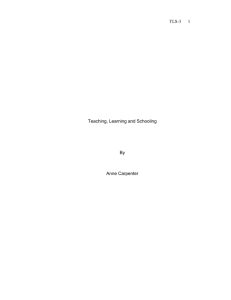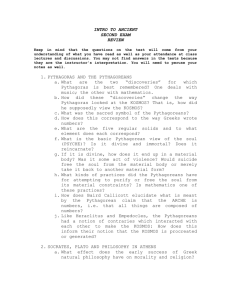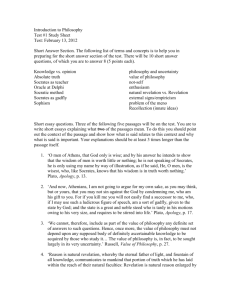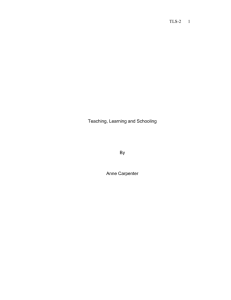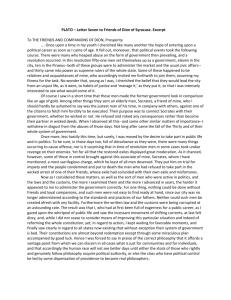Socrates Sample Essay
advertisement
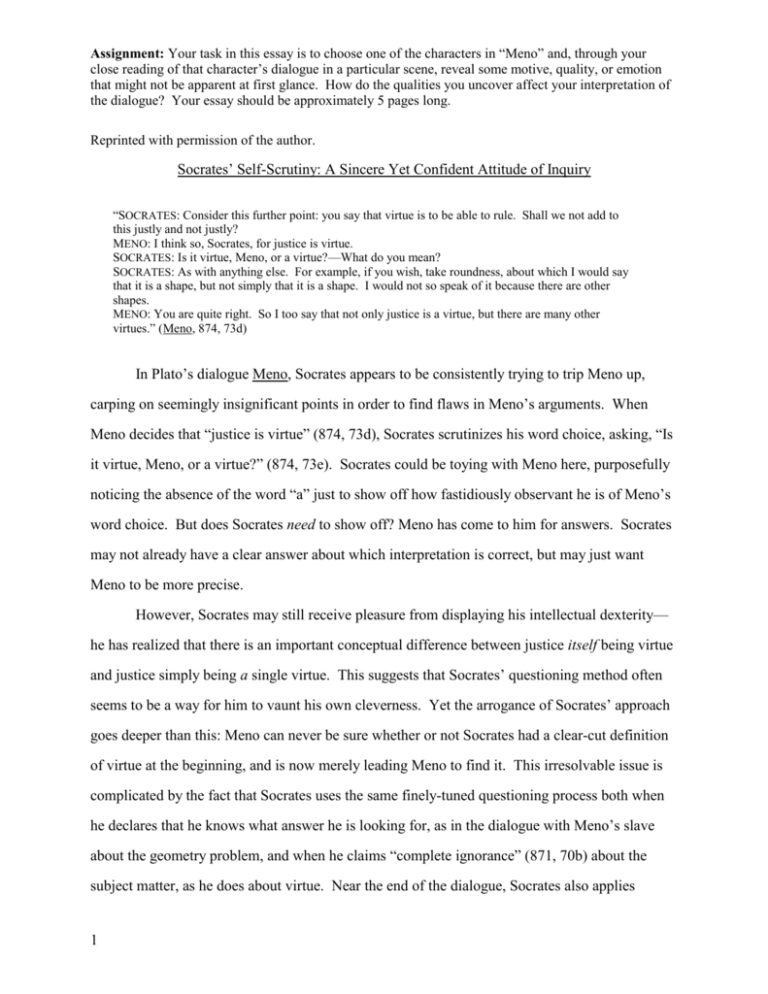
Assignment: Your task in this essay is to choose one of the characters in “Meno” and, through your close reading of that character’s dialogue in a particular scene, reveal some motive, quality, or emotion that might not be apparent at first glance. How do the qualities you uncover affect your interpretation of the dialogue? Your essay should be approximately 5 pages long. Reprinted with permission of the author. Socrates’ Self-Scrutiny: A Sincere Yet Confident Attitude of Inquiry “SOCRATES: Consider this further point: you say that virtue is to be able to rule. Shall we not add to this justly and not justly? MENO: I think so, Socrates, for justice is virtue. SOCRATES: Is it virtue, Meno, or a virtue?—What do you mean? SOCRATES: As with anything else. For example, if you wish, take roundness, about which I would say that it is a shape, but not simply that it is a shape. I would not so speak of it because there are other shapes. MENO: You are quite right. So I too say that not only justice is a virtue, but there are many other virtues.” (Meno, 874, 73d) In Plato’s dialogue Meno, Socrates appears to be consistently trying to trip Meno up, carping on seemingly insignificant points in order to find flaws in Meno’s arguments. When Meno decides that “justice is virtue” (874, 73d), Socrates scrutinizes his word choice, asking, “Is it virtue, Meno, or a virtue?” (874, 73e). Socrates could be toying with Meno here, purposefully noticing the absence of the word “a” just to show off how fastidiously observant he is of Meno’s word choice. But does Socrates need to show off? Meno has come to him for answers. Socrates may not already have a clear answer about which interpretation is correct, but may just want Meno to be more precise. However, Socrates may still receive pleasure from displaying his intellectual dexterity— he has realized that there is an important conceptual difference between justice itself being virtue and justice simply being a single virtue. This suggests that Socrates’ questioning method often seems to be a way for him to vaunt his own cleverness. Yet the arrogance of Socrates’ approach goes deeper than this: Meno can never be sure whether or not Socrates had a clear-cut definition of virtue at the beginning, and is now merely leading Meno to find it. This irresolvable issue is complicated by the fact that Socrates uses the same finely-tuned questioning process both when he declares that he knows what answer he is looking for, as in the dialogue with Meno’s slave about the geometry problem, and when he claims “complete ignorance” (871, 70b) about the subject matter, as he does about virtue. Near the end of the dialogue, Socrates also applies 1 similar methods of questioning to inspect his own ideas—he reexamines and rethinks his previous hypotheses and conclusions. Socrates’ self-scrutiny suggests that he does not argue with the minutiae of Meno’s ideas just for the sake of arguing, but because he is genuinely interested in finding the truth, by making sure that their conclusions about virtue are extremely specific and represent the logical progression of correct premises. Nevertheless, the underlying element of intellectual arrogance inherent in Socrates’ questioning style cannot be ignored: instead, it should be interpreted as a necessary precursor to his sincere pursuit of truth in order to gain a balanced and accurate picture of Socrates. When Socrates asks Meno, “Is it virtue, Meno, or a virtue?” (874, 73e), he not only forces Meno to articulate his thoughts more precisely, but he is also offering Meno another possibility as to what he originally meant to say. Meno may not have considered that his word choice implied that justice and virtue are equivalent. In fact, Meno does not even understand Socrates’ question, and asks him, “What do you mean?” (874, 73e). Socrates has mentioned a slight distinction that Meno neglected. Since Socrates thinks that the absence of the word “a” is important enough to mention, this signals to Meno that it is an important enough concept for him to consider. Socrates would not ask a question unless he believed that it would lead the discussion in the direction he wants to go next. Thus, Socrates’ question does not merely give Meno information on how to correct a logical imprecision; it is a cue to pause and reconsider a perspective that has been overlooked—namely, Socrates’ perspective. Since Socrates always arrogantly perceives his ideas to be the next logical transitions in the conversation, Meno always has to acquiesce to Socrates’ viewpoint in order for the dialogue to progress. If Socrates had never requested that Meno clarify what he was trying to say about justice in this situation, most likely Meno would have continued the discussion based on his initial idea that “justice is virtue.” Socrates conceivably could have come up with an intricate refutation regardless of whether Meno clarified justice to be virtue itself or a single virtue. Socrates could have argued with him about the assumptions of either argument. But it is unrealistic to conjecture how the dialogue would have proceeded if Socrates had not made certain objections. 2 Socrates is constantly pointing out the flaws or assumptions in Meno’s reasoning. This is how Socrates makes sure that Meno is being careful about establishing premises. Socrates is interested in deciding on correct premises, so that their eventual conclusions will be logically sound. Socrates seems to show some false humility about the importance of the teacher in the learning process. Socrates says that he believes “there is no teaching but recollection” (881, 82), so that his role as teacher is merely to jog a kind of eternal memory which each pupil unknowingly possesses. Socrates tests this conjecture by questioning Meno’s slave, to try to discern if he—who has never been taught geometry—can reason out geometric problems if presented with the right questions. Socrates claims that he will not teach the slave anything about geometry in his line of questioning, requesting of Meno, “Watch whether you find me teaching and explaining things to him instead of asking for his opinion” (884, 84d). Socrates previously defined “teaching” (884, 84d) in such a clever way that the method he uses with the slave could not be strictly labeled “teaching,” no matter how much he assists the slave in arriving at the right answer. Socrates’ declaration that he is incidental to the slave’s learning seems to be a sly way of actually emphasizing his own brilliance, as a teacher who can make teaching seem effortless. In fact, the entire episode becomes a way for Socrates to showcase the success of his method and thus his prowess as a teacher, instead of underplaying his teaching as he originally claimed. Since Socrates denies teaching the slave, when he actually appears to be doing quite a bit to guide him to the correct answer, one cannot help but wonder if his claim of “complete ignorance” (871, 70b) about virtue to Meno is somewhat disingenuous. There are certain parallels between the motivations of the questions Socrates asks Meno and those he asks the slave. For instance, Socrates creates a scenario, which makes the solution to the geometric problem much easier for the slave to find. Socrates draws diagonals within each of the small squares in the diagram—something that the slave would probably have never thought of to do. Socrates only draws additional lines because he predicts that this particular action will usefully 3 transform the slave’s perception of the problem, guiding him in the direction of the solution. Likewise, Socrates often challenges Meno’s argument in such a way that it will transition the conversation towards a viewpoint that Socrates supports. Furthermore, Socrates even explicitly tells the slave what the final correct answer is: “You say that the double figure would be that based on the diagonal?” (885, 85b) The slave answers, “Most certainly, Socrates” (885, 85b). The whole episode with the slave was designed by Socrates to reaffirm an idea he was already set upon. Likewise, Socrates could have been taking advantage of Meno’s request to know the nature of virtue as an opportunity for Socrates to reaffirm his own opinions on virtue. In particular, at the end of the discussion with Meno, Socrates asserts that virtue is “a gift from the gods which is not accompanied by understanding” (897, 99e-100). Meno—as well as Plato’s audience—is left wondering whether or not Socrates intended this declaration to be the final conclusion about virtue all along. However, if, as Socrates claims, “searching and learning are, as a whole, recollection” (880, 81d), Socrates may sincerely believe that he has “recollected” this idea that virtue is “divine” (897, 99c). It is important that Socrates does not only question Meno’s ideas—which might just be for the sake of showing off—but also his own. At one point, they both agree to Socrates’ hypothesis that “if virtue is a kind of knowledge, it is clear that it could be taught” (887, 87c). Later, Socrates says that they should rethink that premise, since it might not be correct. “We should not only think it [a hypothesis] right at the time, but also now and in the future if it is to be at all sound” (889, 89c). Here, Socrates is admitting that he was wrong at some time in the past, for the sake of ensuring the truth of their hypotheses. Admitting his previous mistake indicates some humility, which is the opposite of arrogance. In fact, Socrates becomes so involved in analyzing the truth of his own logic that he somewhat gives up on his system of questioning: “Do you know why you wonder, or shall I tell you?—By all means tell me” (895, 97d). This statement could be interpreted as sheer intellectual arrogance, but may in fact reflect Socrates’ eagerness to come to a concrete conclusion about virtue since it appears the 4 conversation is drawing to a close. Actually, Socrates almost always appears more arrogant when he does not blatantly tell the student the answer. Near the end of the dialogue, Socrates is treating Meno as more of an equal since he is letting the veil of the “Socratic method” fall slightly. That is, actually resolving something about virtue—even if it means outright telling Meno what it is—becomes more important than making Meno figure out an insight for himself. Socrates finds it imperative that at the end of the dialogue, they review the progression of their conclusions about virtue. It is not enough to begin with certain premises and then accept the conclusions derived from them. He goes over every point that was made in succession, such as, “And that if there were teachers of it [virtue], it could be taught, but if there were not, it was not teachable?—That is so. And then we agreed that there were no teachers of it?—We did. So we agreed that it was neither teachable nor knowledge?—Quite so” (896, 98d-e). Socrates’ final request illuminates his irrepressible desire to receive recognition for the success of his teaching method in discovering a truth about virtue. As Socrates is leaving Meno, he tells him, “You convince your guest friend Anytus here of these very things of which you have yourself been convinced” (897, 100b). It is unclear how much Socrates was motivated by an ultimate hope in receiving acknowledgment for his teaching, and avoiding anxiety about failing to meet the expectations of “the folk back home” (872, 71c). Yet the desire for fame might not be completely “incompatible” (Regaignon, letter communication) with the pursuit of truth, because Socrates had to have a certain amount of arrogance to attempt to grapple with such a difficult task as defining the true nature of virtue. Even Meno’s arrogance, in his initial seemingly authoritative speech on male and female virtue, was necessary: Socrates’ refutation of Meno’s initial argument became the launching point for the whole dialogue. Socrates himself says, “we will be better men, braver and less idle, if we believe that one must search for the things one does not know, rather than if we believe that it is not possible to find out what we do not know and that we must not look for it” (886, 86b-c). Thus, an important part of searching for truth is indeed to have a certain intellectual arrogance: Socrates has enough confidence in his eventual success that he does not give up on the quest. Indeed, the entire pursuit of knowledge 5 hinges on the rather arrogant hope that human beings can understand the mysteries of the universe just by asking questions—yet without that bit of arrogance, we might be sadly overwhelmed by the vastness of the unknown and never bravely explore it. 6 Works Cited Plato. “Meno.” Plato’s Complete Works. Ed. John M. Cooper. Indianapolis: Hackett, 1997. Online (Princeton University E-Reserves). Regaignon, Dr. Dara Rossman. Letter communication [comments about essay]. Written before our conference (19 February 2002). 7
